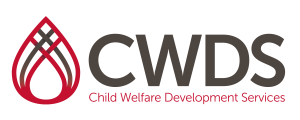CWDS Curriculum
Separation, Loss and Transitioning into Placement
Level: Advanced Practice – Lineworker
Credits: 6
Intended Audience: This course is intended for social workers, CPS workers, counselors, residential staff, and foster parents who are involved in the placement transition process and want to obtain more skills and knowledge to achieve better outcomes for children and families
Intended Objectives:
Understand the impact of traumatic separation as a crisis event for the child
Value methods that mitigate the impact of loss and separation
Develop skills to help placement providers successfully integrate children into a new placement
Topics Include:
- Traumatic events, from the child perspective
- Helping children manage loss
- Understanding the child in crisis
- Strategies and creating a “roadmap” for transition into placement
CalSWEC Competencies Addressed:
2.12 Student understands how attachment, separation and placement affect a child and family, and how these experiences may influence a child’s physical, cognitive, social, and emotional development.
2.12 Student understands the importance of working with biological families, foster families, and kin networks, involving them in assessment and planning and supporting them in coping with special stresses and difficulties.
3.1 Student demonstrates understanding of the stages, processes, and milestones of physical, cognitive, social, and emotional development of children.
7.1 Student demonstrates the ability to assess the effects of family transitions and the impact of becoming a client of the child welfare system.
7.4 Student demonstrates understanding of the dynamics of trauma resulting from family conflict, divorce, and family violence.
ASFA Outcomes Addressed:
- Child Safety
- Child Well Being
- Collaboration
- Fairness and Equity
Permanency: Reunification, Foster Care and Adoptions



